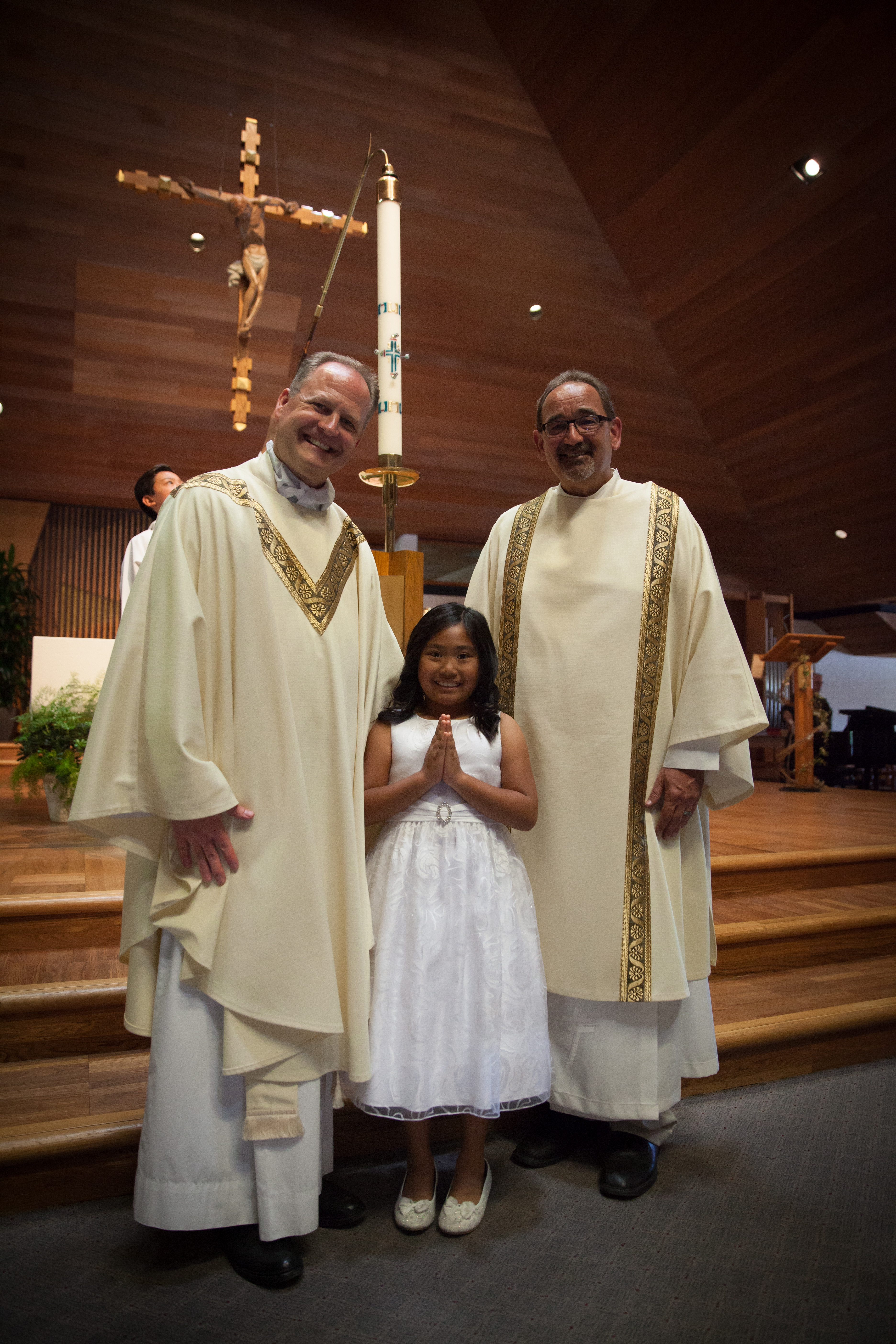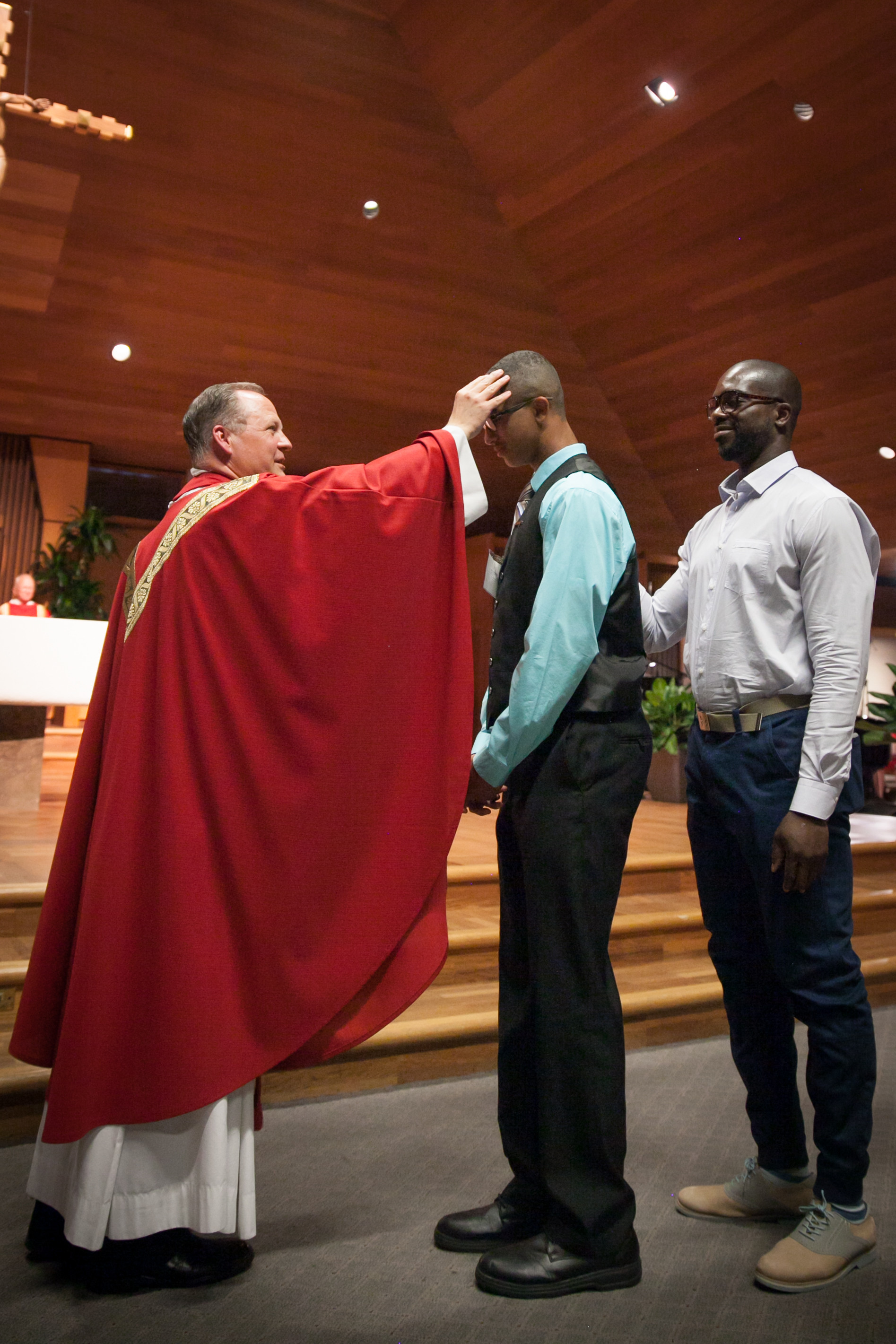Sacraments of Intitiation
Baptism
The first of seven sacraments, Baptism brings us to life in Christ. Baptism is also the first of three Sacraments of Initiation (Baptism, Holy Communion, and Confirmation). Once a person is baptised, they are a member of the church.
Baptism has six primary graces:
- The removal of the guilt of both Original Sin (the sin imparted to all mankind by the Fall of Adam and Eve in the Garden of Eden) and personal sin (the sins that we have committed ourselves).
- The remission of all punishment that we owe because of sin, both temporal (in this world and in Purgatory) and eternal (the punishment that we would suffer in hell).
- The infusion of grace in the form of sanctifying grace (the life of God within us); the seven gifts of the Holy Spirit; and the three theological virtues.
- Becoming a part of Christ.
- Becoming a part of the Church, which is the Mystical Body of Christ on earth.
- Enabling participation in the sacraments, the priesthood of all believers, and the growth in grace.
Baptism as an infant or child under seven can be initiated by emailing Fr. Peter McGuine to make an appointment. For those seven and older can complete the sacrament of baptism through OLG's Faith Formation (RCIA) classes.
Holy Communion

The Holy Eucharist is the most important of the seven sacraments because, in this and in no other sacrament, we receive the very body and blood, soul and divinity of Jesus Christ. Innumerable, precious graces come to us through the reception of Holy Communion.
Communion is an intimate encounter with Christ, in which we sacramentally receive Christ into our bodies, that we may be more completely assimilated into his. "The Eucharist builds the Church," as Pope John Paul II said (Redemptor Hominis 20). It deepens unity with the Church, more fully assimilating us into Christ (1 Cor. 12:13; CCC 1396).
The Eucharist also strengthens the individual because in it Jesus himself, the Word made flesh, forgives our venial sins and gives us the strength to resist mortal sin. It is also the very channel of eternal life: Jesus himself.
In John’s gospel, Jesus summarized the reasons for receiving Communion when he said:
Truly, truly, I say to you, unless you eat the flesh of the Son of man and drink his blood, you have no life in you; he who eats my flesh and drinks my blood has eternal life, and I will raise him up at the last day. For my flesh is real food, and my blood is real drink. He who eats my flesh and drinks my blood abides in me, and I in him. As the living Father sent me, and I live because of the Father, so he who eats me will live because of me. This is the bread which came down from heaven, not such as the fathers ate and died; he who eats this bread will live forever.
John 6:53–58
Because of the gravity of Jesus’ teaching on receiving the Eucharist, the Church encourages Catholics to receive frequent Communion, even daily Communion if possible, and mandates reception of the Eucharist at least once a year during the Easter season. Before going to Communion, however, there are several things one needs to know.
Thank you to Catholic Answers
Confirmation

The prophets of the Old Testament foretold that God's Spirit would rest upon the Messiah to sustain his mission. Their prophecy was fulfilled when Jesus the Messiah was conceived by the Spirit and born of the Virgin Mary. The Holy Spirit descended on Jesus on the occasion of his baptism by John. Jesus' entire mission occurred in communion with the Spirit. Before he died, Jesus promised that the Spirit would be given to the Apostles and to the entire Church. After his death, he was raised by the Father in the power of the Spirit.
Confirmation deepens our baptismal life that calls us to be missionary witnesses of Jesus Christ in our families, neighborhoods, society, and the world. . . . We receive the message of faith in a deeper and more intensive manner with great emphasis given to the person of Jesus Christ, who asked the Father to give the Holy Spirit to the Church for building up the community in loving service.
In the Sacrament of Confirmation, the baptized person is "sealed with the gift of the Holy Spirit" and is strengthened for service to the Body of Christ.
from the United States Catholic Catechism for Adults


